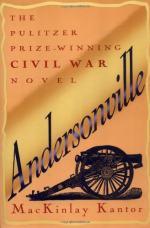The effects of the great bodily emaciation were sometimes very startling. Boys of a fleshy habit would change so in a few weeks as to lose all resemblance to their former selves, and comrades who came into prison later would utterly fail to recognize them. Most fat men, as most large men, died in a little while after entering, though there were exceptions. One of these was a boy of my own company, named George Hillicks. George had shot up within a few years to over six feet in hight, and then, as such boys occasionally do, had, after enlisting with us, taken on such a development of flesh that we nicknamed him the “Giant,” and he became a pretty good load for even the strongest horse. George held his flesh through Belle Isle, and the earlier weeks in Andersonville, but June, July, and August “fetched him,” as the boys said. He seemed to melt away like an icicle on a Spring day, and he grew so thin that his hight seemed preternatural. We called him “Flagstaff,” and cracked all sorts of jokes about putting an insulator on his head, and setting him up for a telegraph pole, braiding his legs and using him for a whip lash, letting his hair grow a little longer, and trading him off to the Rebels for a sponge and staff for the artillery, etc. We all expected him to die, and looked continually for the development of the fatal scurvy symptoms, which were to seal his doom. But he worried through, and came out at last in good shape, a happy result due as much as to anything else to his having in Chester Hayward, of Prairie City, Ill.,—one of the most devoted chums I ever knew. Chester nursed and looked out for George with wife-like fidelity, and had his reward in bringing him safe through our lines. There were thousands of instances of this generous devotion to each other by chums in Andersonville, and I know of nothing that reflects any more credit upon our boy soldiers.
There was little chance for any one to accumulate flesh on the rations we were receiving. I say it in all soberness that I do not believe that a healthy hen could have grown fat upon them. I am sure that any good-sized “shanghai” eats more every day than the meager half loaf that we had to maintain life upon. Scanty as this was, and hungry as all were, very many could not eat it. Their stomachs revolted against the trash; it became so nauseous to them that they could not force it down, even when famishing, and they died of starvation with the chunks of the so-called bread under their head. I found myself rapidly approaching this condition. I had been blessed with a good digestion and a talent for sleeping under the most discouraging circumstances. These, I have no doubt, were of the greatest assistance to me in my struggle for existence. But now the rations became fearfully obnoxious to me, and it was only with the greatest effort—pulling the bread into little pieces and swallowing each, of these as one would a pill—that I succeeded in worrying the stuff down. I had not as yet fallen away very much, but as I had never, up, to that time, weighed so much as one hundred and twenty-five pounds, there was no great amount of adipose to lose. It was evident that unless some change occurred my time was near at hand.




